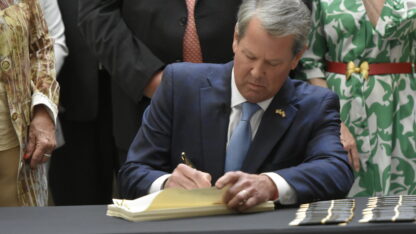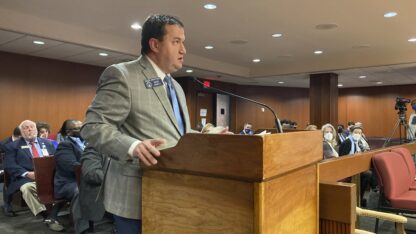At long last, Gov. Brian Kemp has signed a controversial school voucher program into Georgia law.
Senate Bill 233 establishes the “Georgia Promise Scholarship,” a fund to subsidize private school tuition – or costs associated with homeschooling – for families who choose to leave their local public school.
Only families districted for schools performing in the bottom 25% would be eligible for that money – a $6,500 “voucher.”
The ceremony took place at Liberty Plaza, just across from the Gold Dome in downtown Atlanta.
Though the governor rubber-stamped several education bills at the signing — including a social media bill requiring kids younger than 16 to seek explicit parental permission to create social media accounts — vouchers are the package’s crown jewel.
Last year, the bill fell shy in the House of Representatives after passing the Senate. Proponents needed 91 votes. They got 85.
This year, Gov. Kemp made it clear he wanted SB 233 over the finish line.
“We have run out of ‘next years,’” Kemp said during his State of the State address.
The bill’s passage is a triumph for Kemp and other conservatives who have spent years advocating for “school choice.”
“The bottom line [is SB 233] empowers parents with the option to make the best decision possible when it comes to educating their children,” said Republican House Speaker Jon Burns during the session. “We will not let our children be trapped in a failing school.”
However, not everyone agrees that vouchers should be the solution for struggling school systems.
“It’s just a bad bill,” said Democratic Rep. Karlton Howard during the session. “It’s defunding our public schools.”
Howard explained that headcount is part of Georgia’s education funding formula, so losing children to the vouchers program means less money for school districts.
To that point, voucher advocates often counter that only state funding would be impacted by headcount; local funding would remain intact. So, districts would have more local money per pupil if students opt into a voucher program.
For Lisa Morgan, president of the Georgia Association of Educators, that does not change what she sees as core to the voucher debate.
“Our children are experiencing poverty,” she said. “They need more resources. They don’t need resources taken out.”
“This bill is focused on a small vocal minority, rather than the majority of our citizens [who are] opposed to using public school funds for private school tuition for our students,” she continued.
A survey conducted earlier this year by the left-leaning Georgia Budget and Policy Institute determined the same. All ideological groups surveyed expressed opposition to a vouchers program – 50.2% of conservatives (a +14.4% margin), 57.3% of moderates (a +26.1% margin) and 56.7% of liberals (a +18.5 margin).
The criticism surrounding the voucher program doesn’t stop there.
States like Tennessee, Florida and Arizona have already passed voucher programs. Progressive advocates use those states as an example of what is to come in the Peach State – ballooning appropriations for programs that are made available to more and more students.
According to Republican House Pro Tem Jan Jones, that charge is hyperbolic in Georgia.
Jones was one of the co-authors of the voucher bill and helped carry the legislation through the House.
Unlike previous versions of SB 233, the one passed and signed by the governor sets a hard ceiling on how much money Georgia will spend on its vouchers program: 1% of what the Quality Basic Education formula says lawmakers should put into the budget for public education.
Today, that would amount to about $140 million.
If there are too many takers, the state will prioritize families who make less than four times the federal poverty line, which is about $120,000 for a family of four.
Families cannot access vouchers until the 2025-26 school year, and the program is set to run for a decade, after which it will be re-evaluated.
For Pro Tem Jones, these additions to the voucher bill are a safety net, ensuring that the voucher program is just a “compliment” to other ways that the state supports education. Gov. Kemp said the same when he signed SB 233 into law. The bill is part of an “all of the above” strategy.
But that rationale does little to assuage the suspicions of those who see SB 233 as the first step down a slippery slope.
“A government does not create a program that gets smaller,” said Democratic Rep. David Wilkerson, just ahead of the final vouchers vote at the capitol. He fears that a universal voucher program is in Georgia’s future.
“No longer will you worry about your local public schools,” he continued. “You’ll worry about that private school that you’re trying to get your child into because your public schools have been harmed by the dollars that they’ve lost.”









